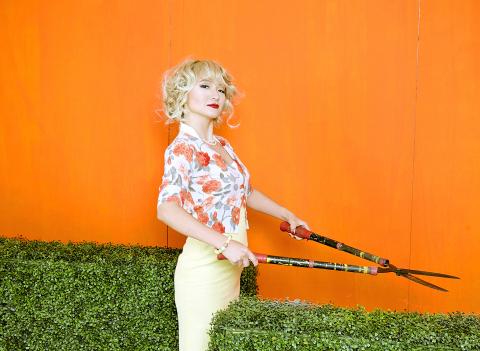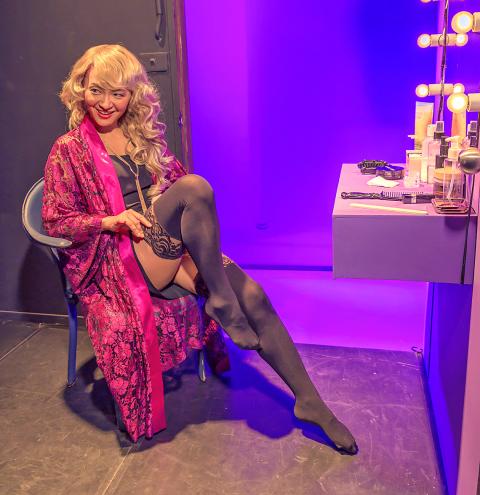“Things are not always what they seem,” says Tanya, the blonde.
If so, then how much self-deception enters the imaginings of our everyday lives?
Butterfly Effect’s production of Robert Hewett’s The Blonde, the Brunette and the Vengeful Redhead, presents this question and we, the audience, can only rely on the Roshomon Effect monologue stories of the seven characters, male and female, ranging from four to over 60.

Photo courtesy of Michael Geier and LAB Space
There is a death but who, how and why? Kim Chen (程鈺婷) is the tour de force storyteller taking on all roles and if you weren’t a fan of hers before taking your seat, you will be by play’s end.
Kim deftly personalizes the gestures, language and intonation of each of the seven in a tale that begins after Rhonda’s husband Graham has cowardly ended their seventeen-year marriage over the phone.
However, what makes Hewett’s play a gem for the audience is that even while enjoying the performance, we are forced to examine the isolation of everyman’s limited perceptions.

Photo courtesy of Michael Geier and LAB Space
Different pieces of the puzzle will come from each character, but it is only “years later” at play’s end that the never seen but previously mentioned Ellen brings resolution.
Time sequences and Chinese translations of dialogue are found on stage right. Yang Chih-yi’s (楊之儀) set, Jenna Robinette’s costumes and Anton Botes’ sound design skillfully keep pace with each changing monologue.
This summer classic is not to be missed.

On April 26, The Lancet published a letter from two doctors at Taichung-based China Medical University Hospital (CMUH) warning that “Taiwan’s Health Care System is on the Brink of Collapse.” The authors said that “Years of policy inaction and mismanagement of resources have led to the National Health Insurance system operating under unsustainable conditions.” The pushback was immediate. Errors in the paper were quickly identified and publicized, to discredit the authors (the hospital apologized). CNA reported that CMUH said the letter described Taiwan in 2021 as having 62 nurses per 10,000 people, when the correct number was 78 nurses per 10,000

As we live longer, our risk of cognitive impairment is increasing. How can we delay the onset of symptoms? Do we have to give up every indulgence or can small changes make a difference? We asked neurologists for tips on how to keep our brains healthy for life. TAKE CARE OF YOUR HEALTH “All of the sensible things that apply to bodily health apply to brain health,” says Suzanne O’Sullivan, a consultant in neurology at the National Hospital for Neurology and Neurosurgery in London, and the author of The Age of Diagnosis. “When you’re 20, you can get away with absolute

May 5 to May 11 What started out as friction between Taiwanese students at Taichung First High School and a Japanese head cook escalated dramatically over the first two weeks of May 1927. It began on April 30 when the cook’s wife knew that lotus starch used in that night’s dinner had rat feces in it, but failed to inform staff until the meal was already prepared. The students believed that her silence was intentional, and filed a complaint. The school’s Japanese administrators sided with the cook’s family, dismissing the students as troublemakers and clamping down on their freedoms — with

As Donald Trump’s executive order in March led to the shuttering of Voice of America (VOA) — the global broadcaster whose roots date back to the fight against Nazi propaganda — he quickly attracted support from figures not used to aligning themselves with any US administration. Trump had ordered the US Agency for Global Media, the federal agency that funds VOA and other groups promoting independent journalism overseas, to be “eliminated to the maximum extent consistent with applicable law.” The decision suddenly halted programming in 49 languages to more than 425 million people. In Moscow, Margarita Simonyan, the hardline editor-in-chief of the